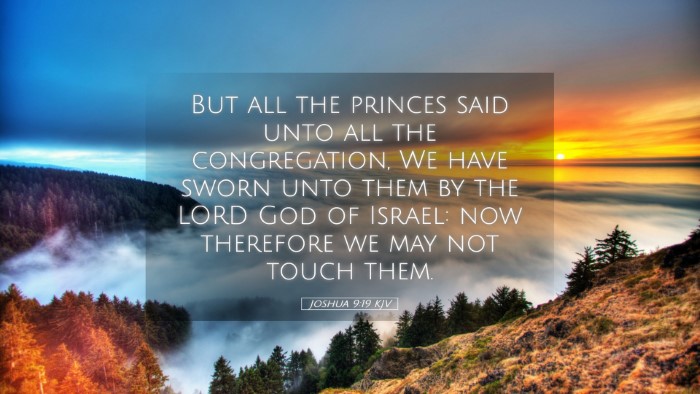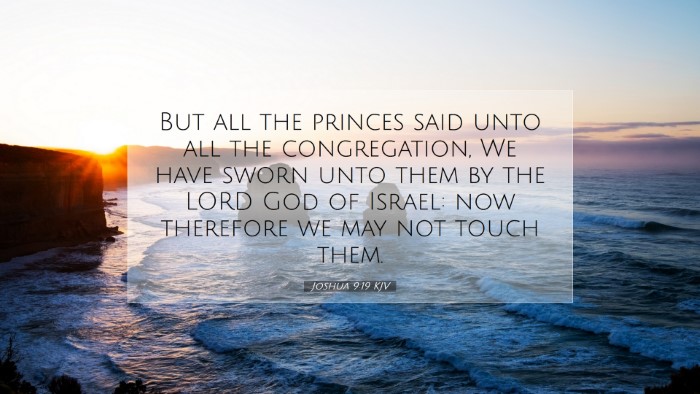Commentary on Joshua 9:19
Verse: Joshua 9:19
"But all the princes said unto all the congregation, We have sworn unto them by the Lord God of Israel: now therefore we may not touch them."
Introduction
This passage is set against the backdrop of the Israelites' conquest of Canaan and the significant role that integrity and faithfulness play within the community of believers. The context speaks to a crucial moment where the leaders must confront the consequences of their oath sworn to the Gibeonites, illustrating the balance between divine command and human obligation.
Understanding the Oath
The leaders of Israel recognize the weight of their promise made in the name of the Lord, reflecting the deep-seated principle that once a vow is made before God, it must be honored. As interpreted by Matthew Henry, this moment emphasizes that oaths made in God's name carry profound significance. Henry observes that breaking such an oath is a grave matter as it not only dishonors the promise but also brings disrepute upon God's name.
The Role of Leadership
This response signifies the role of the leaders in Israel's community, as noted by Albert Barnes. He highlights the collective acceptance of responsibility among the princes, demonstrating that leadership involves accountability not just for oneself but for the entire congregation. Barnes suggests that this unity is vital, portraying a community aligned with God's will, regardless of personal sentiments about the Gibeonites.
Faithfulness and Integrity
In examining this verse, Adam Clarke notes that faithfulness to commitments transcends individual rationale. Clarke argues that the principle of keeping one’s word strengthens the moral fabric of society and binds the community together, thereby manifesting God’s character through human actions.
Theological Implications
This situation opens a deeper theological discussion regarding the nature of divine expectation and human responsibility. The Israelites' oath, made in faith, is a testament to God’s covenant relationship with His people. Henry concludes that even when faced with consequences that might lead to swift judgment, faithfulness remains paramount. Fulfilling their oath ensures that Israel remains a people of integrity.
Implications for Congregational Life
For modern congregations, this passage serves as a profound reminder of the importance of integrity in leadership and community life. Barnes points out that congregational unity can often hinge on the consistency and integrity of its leaders, illustrating a message that is as relevant today as it was in Joshua's time.
- Trustworthiness: Building trust through consistent actions and fulfilling commitments even when challenges arise.
- Ethical Leadership: Leaders must exhibit moral integrity that reflects God's expectations and inspires similar actions in others.
- Covenantal Relations: Reflecting on how the agreements and commitments made by church leaders affect the whole body of believers.
Conclusion
The essence of Joshua 9:19 extends beyond historical context to deliver a message of the importance of fidelity to God's commands and the necessity of integrity within community engagements. As leaders and congregants alike, reflecting the commitment made to uphold oaths in God’s name is paramount. As Clarke insightfully notes, the consequences of fidelity reverberate beyond immediate circumstances, impacting the broader witness of God's people in every generation.
In closing, it is incumbent upon pastors, students, and theologians to continually evaluate how their commitments reflect God's character in today's culture, reminding them that every oath holds celestial significance and demands spiritual fidelity.


